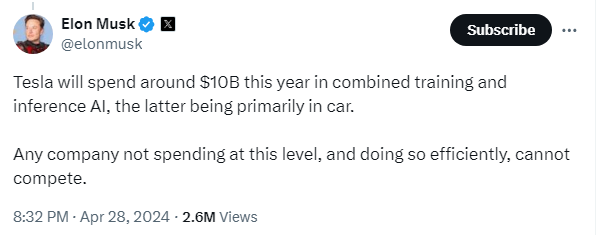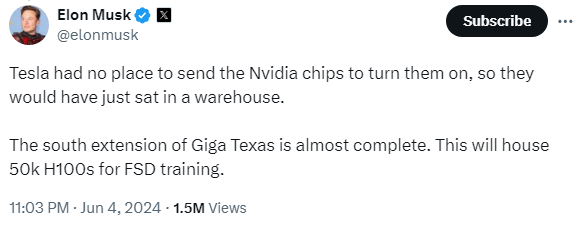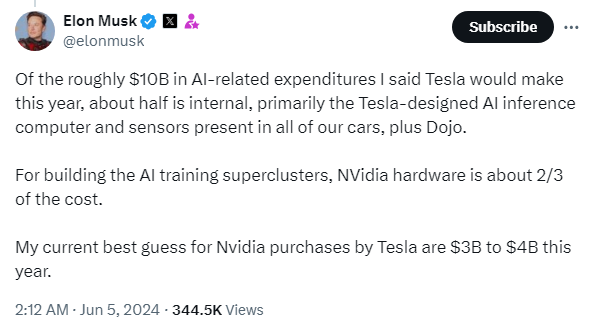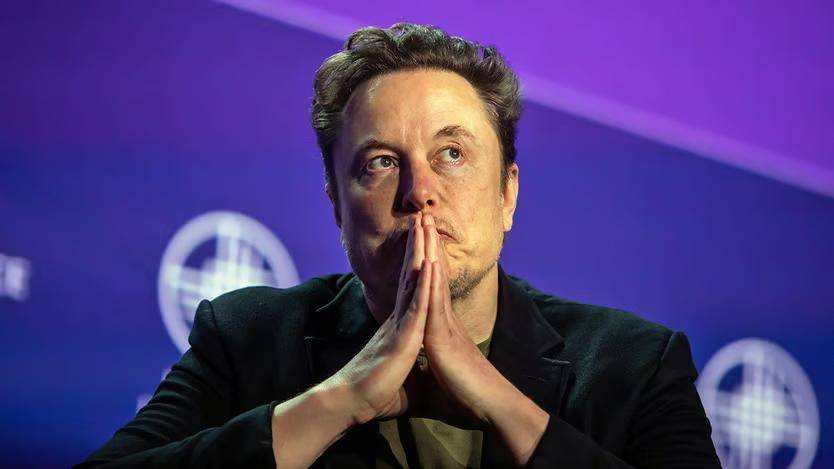Musk Redirected NVIDIA's AI Chips From Tesla to X?
On June 5, it is reported that Musk prioritised the allocation of Nvidia chips originally reserved for Tesla to his X and xAI companies, to which Musk later responded that Tesla would not need to use them for the time being.
On June 5, it was reported that Musk demanded Nvidia to prioritize the delivery of AI chips originally designated for Tesla to its subsidiaries, X Corp. and xAI Corp.. This might potentially lead to delays for Tesla in acquiring GPUs worth over $500 million, consequently affecting the progress of Tesla's development of supercomputers required for FSD vehicles and Robotaxi.
Tesla Subsidies Being Robbed?
In this April, during Tesla's first-quarter earnings call, Musk revealed the company's plan to increase the usage of Nvidia's H100 chips from 35,000 to 85,000 within the year. A few days later, he announced on the X platform that Tesla would invest $10 billion this year in "combined training and inference AI", primarily for research and development in the automotive field.

However, internal emails from Nvidia suggested that Musk exaggerated Tesla's actual procurement situation, stating that he redirected a significant batch of AI processors originally reserved for Tesla to X.
In last December, a memo from Nvidia indicated that Musk redirected 12,000 already shipped H100 GPUs intended for Tesla to X, prioritizing X's H100 GPU cluster deployment over Tesla's. In exchange, X orders scheduled for January and June were to be transferred to Tesla.
At the end of this April, Nvidia sent another email stating that the actual situation contradicted Musk's previous statements about "order volume" during the earnings call and X posts. Moreover, the allocation of AI computing power this time is likely to delay the development progress of FSD vehicles and Robotaxi, causing dissatisfaction among the majority of shareholders.
The email also mentioned rumors of significant layoffs at Tesla and warned that layoffs could further delay the "H100 project" at Tesla's Gigafactory in Texas.
Musk's Quick Response
However, Musk quickly responded to the "X and xAI cutting in line" issue on the X platform.

In a series of replies, he stated that Tesla no longer had a place to deploy these Nvidia chips, so they had to be stored in the warehouse. Considering that the southern expansion project of Tesla's Gigafactory in Texas is about to be completed, it will be able to accommodate 50,000 Nvidia H100 chips for FSD training.
The next day, Musk pointed out in another post that Nvidia cannot fully track all of Tesla's AI-related expenses this year. Nearly half of Tesla's $10 billion investment will be used for internal expenses, mainly including AI inference computers, sensors, and the Dojo supercomputer designed and applied autonomously by Tesla for its brand vehicles.
For Nvidia hardware procurement, the funds will account for about two-thirds of the total cost, estimated to be around $3 billion to $4 billion.

Plagued With Troubles
This is happening amidst intense competition between xAI and other AI companies like OpenAI and Google for the development of practical applications for AGI and its underlying LLM.
It is understood that Musk acquired X Company for $44 billion at the end of 2022 and established xAI Company the following year. The two companies have a close relationship, and by the end of 2023, it was announced that investors in X would own approximately 25% of xAI. Last month, the company secured $6 billion in funding based on its cutting-edge products and supporting infrastructure.
However, this controversy arises just before crucial Tesla shareholders vote on its compensation plan.
It is reported that Musk stated in January of this year that if he personally did not have 25% voting control, he would prefer to develop AI products outside of Tesla. A few weeks later, a court in Delaware ruled that the compensation plan would grant him stock options worth hundreds of billions of dollars and increase his ownership stake in the company.
On June 13, Tesla shareholders will vote on the compensation plan at the annual meeting.

·Original
Disclaimer: The views in this article are from the original Creator and do not represent the views or position of Hawk Insight. The content of the article is for reference, communication and learning only, and does not constitute investment advice. If it involves copyright issues, please contact us for deletion.